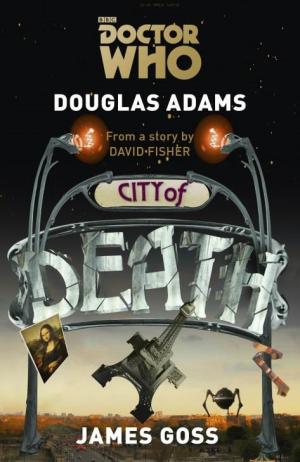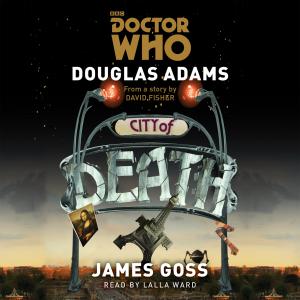
Written by James Goss
Based on the script by Douglas Adams
Based on a story by David Fisher
Released by BBC Books, 21 May 2015

Read by Lalla Ward
Released by BBC Audio, 21 May 2015
For many Doctor Who fans there is only one thing that sentence can possibly mean. For that place and that time are (mostly) the setting for a story from Tom Baker’s penultimate season – and it happens to be a story which is often considered to be one of the all-time greats in the history of the show. Fast-forward (or fast return, it all depends on your point of view) to 2015 and an all-new novelisation of the serial has arrived on bookshelves under the authorship of James Goss. But to see exactly how this came about, we need to step back a little.
2012 saw the release of a novelisation of another Season 17 story, Shada. But there was one big difference: Shada was never finished and thus never transmitted. So that novel, written by Gareth Roberts, actually provides one of our only means of experiencing the story as a complete entity. It was considered a great success, and paved the way for a further book adaptation of another Douglas Adams script which, likewise, had never been novelised.
Enter City of Death.
While these books share a common heritage, then, this latest one has an issue all of its own to contend with. Unlike Shada, City of Death exists in its entirety as a TV serial produced three-and-a-half decades ago. Which raises the question: how far does the book stray from the established path that so many people know and love? Well, the finished novel achieves a brilliant balance.
Perhaps the most important thing to be aware of is that although a considerable amount of the dialogue is recognisable from the story as we know it, Goss has used the original rehearsal scripts as the basis for his novel. This means that while the story is fundamentally unchanged, much of the dialogue and action is either new (deleted from the finished TV show) or different to some extent from how it turned out on screen. The result is quite fascinating. In addition, of course, Goss has embellished and added even further to the story, and this is in evidence almost immediately. To cite an early example, the Doctor and Romana’s first visit to the Louvre is entirely familiar and yet radically different.
The book’s first chapter contains some of its most notable deviations from the televised original (and in this sense you could argue that the first chapter is the book’s most atypical), but this turns out to be a masterstroke. Before we see the Doctor and Romana in Paris (and no, this is no longer their first appearance in the novel) the book does what only a book can: it elaborates substantially on the backstory of almost any character you could care to mention, not just through dialogue but also by transporting the reader into the minds of the characters themselves. For readers familiar with the original material, this makes for a hugely eye-opening introduction to this new interpretation of the story. It has to be said that for those who aren’t as overly acquainted with City of Death, the first chapter could perhaps be a little less effective – not quite so much of a ‘hook’ into the novel, but taking on much more meaning by the time of its conclusion.
As the book progresses and catches up with the narrative of the original TV episodes, that’s where the benefits of the written medium become very clear. Goss’ writing is rich, witty and compelling, not only a superb homage to the late Douglas Adams (indeed, a number of phrases in the book originate from stage directions in the scripts themselves, but except for the examples given in the notes at the back of the book you probably wouldn’t be able to tell the Adams from the Goss – the language is incredibly consistent and harmonious throughout) but also a match made in heaven with the story itself. If there’s any TV serial which particularly suits being made into a novel, it must be this one; one of the most evocative Doctor Who stories becomes one of the most evocative Doctor Who books. It isn’t entirely hyperbolic to say that for a short while, when the pages of this book are open, it’s not too difficult to imagine that you might be in Paris (especially if you have the fortune to actually be in Paris).
Also available is an unabridged audiobook release of City of Death. Read by Lalla Ward (Romana) and running to around nine hours and forty-five minutes, the audiobook is an enjoyable way to experience the story and has a character all of its own. Ward’s reading is sharp, clear and well-performed, and the release also takes the opportunity to spruce up the soundscape via the careful use of sound effects. This definitely improves the overall listening experience while remaining restrained and respectful to the underlying material. But because the audiobook obviously runs at a pre-determined pace, there are a few moments which seem to pass by slightly too quickly – not major plot elements, but some of the subtleties of the writing which don’t have the chance to sink in as well, compared to reading the book at your own pace. Ultimately this comes down to personal preference, but having experienced both the hardback and the audiobook, the former did seem more satisfying overall, even though the audio release is still great fun in its own right.
For more than three decades, City of Death has been (no pun intended) a closed book. Four episodes of a television show which has been on our screens – on and off – for over fifty years. But serendipitously, the fact that the story is among those never to have been originally novelised has opened the door for this tremendous new book; at once a fresh reworking and a faithful retelling of a classic adventure. If there’s one reason to buy it, it’s that once you’ve read the book the story will never be the same again. Frankly, after finishing the book it feels like the TV episodes have lots of bits missing. Bits which, just for a moment, you would be forgiven for thinking you’d actually seen performed by the actors in 1979. Events in the original (some of which don’t really make a great deal of sense, with hindsight) are justified and explored, often without even being changed to any significant extent. City of Death is now an even richer and more satisfying story than ever before, and it’s a sheer delight that Season 16’s The Pirate Planet is set to receive the book treatment (once again from Goss) next year. Who says you can’t improve on perfection?
